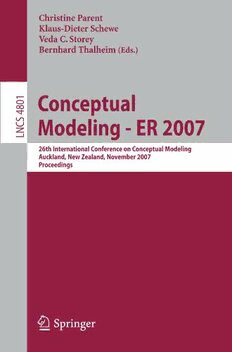
Conceptual Modeling - ER 2007: 26th International Conference on Conceptual Modeling, Auckland, New Zealand, November 5-9, 2007. Proceedings PDF
644 Pages·2007·13.055 MB·English
Most books are stored in the elastic cloud where traffic is expensive. For this reason, we have a limit on daily download.
Preview Conceptual Modeling - ER 2007: 26th International Conference on Conceptual Modeling, Auckland, New Zealand, November 5-9, 2007. Proceedings
Description:
Conceptual modeling is fundamental to the development of complex systems, because it provides the key communication means between systems developers, end-usersandcustomers.Conceptualmodelingprovideslanguages,methods and tools to understandandrepresentthe applicationdomain;to elicitate,concep- alizeandformalizesystemrequirementsanduserneeds;tocommunicatesystems designs to all stakeholders; to formally verify and validate system designs on high levels of abstractions; and to minimize ambiguities in system development. Initially, conceptual modeling mainly addressed data-intensive information s- tems and contributed to data modeling and database application engineering. The area of conceptual modeling has now matured to encompass all kinds of application areas such as e-applications (including e-business and e-learning), web-based systems (including the semantic web and ubiquitous systems), life science and geographic applications. The annual International Conference on Conceptual Modeling serves as the premiere forum for presenting and discussing researchand applications in all - eas associatedwith conceptual modeling. This year,the Call for Papers solicited contributions dealing with logical and philosophical foundations of conceptual modeling, information modeling concepts including ontologies, correctness in modeling, web-based and mobile information systems, semi-structured data and XML, information and database integration, information retrieval, organization andevaluation,designmethodologiesandtools,reuse,re-engineeringandreverse engineering, quality assurance in conceptual modeling, conceptual change and evolution, data warehousing and data mining, spatial and temporal modeling, business process and work?ow modeling, knowledge management, requirements elicitation, and advanced applications.
See more
The list of books you might like
Most books are stored in the elastic cloud where traffic is expensive. For this reason, we have a limit on daily download.
